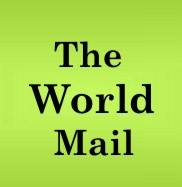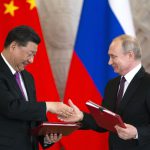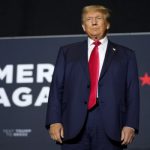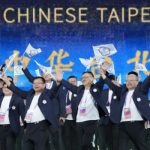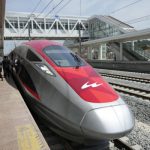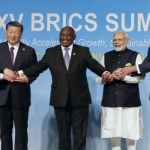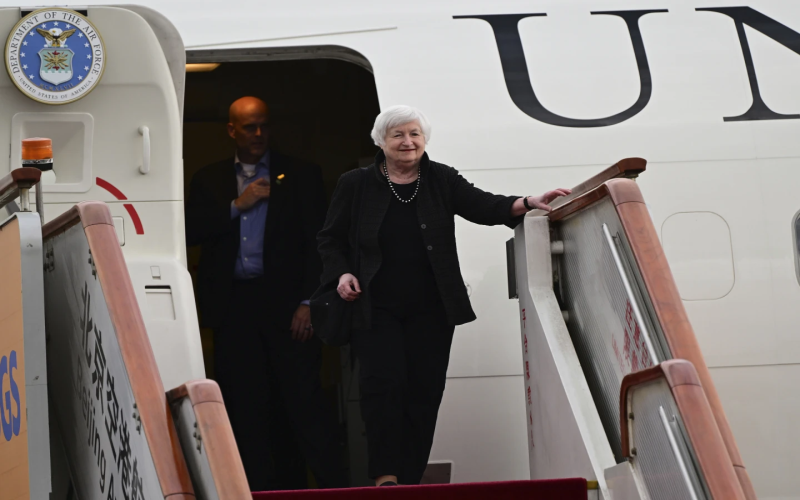
BEIJING, China (AP) — Treasury Secretary Janet Yellen is visiting Beijing as part of efforts to revive U.S.-Chinese relations that are at their lowest level in decades due to disputes over technology, security and other irritants.
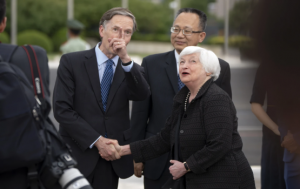
Presidents Joe Biden and Xi Jinping met in November and agreed to improve relations between the world’s biggest economies and major trading partners. But neither government has shown willingness to make major policy changes.
“We hope the United States takes concrete actions to create a favorable environment for the healthy development of economic and trade relations,” the Chinese finance ministry said in a statement Friday.
It expressed hope for “the realization of mutual benefit and win-win results” but did not suggest possible Chinese concessions.
Yellen’s visit follows one by Secretary of State Antony Blinken, who met with Xi last month in Beijing in an encounter that lasted just 30 minutes.
Here’s a look at some areas of contention.
POLITICAL RELATIONS
U.S.-Chinese relations are riven by disputes over technology, security, human rights, Beijing’s assertive policies abroad and its support for Russia during its war on Ukraine. Despite an agreement between Biden and Xi to improve relations during a meeting in Indonesia in November, ties worsened after a Chinese surveillance balloon drifted over the United States in February and was shot down. Secretary of State Antony Blinken flew to Beijing in June in the highest-level U.S. visit in five years and had a meeting with Xi that lasted just 30 minutes.
EXPORT CONTROLS
The United States has blocked Chinese access to advanced processor chips and other technology on security grounds. Beijing has been slow to retaliate, possibly to avoid disrupting China’s fledgling developers of artificial intelligence and other technologies. But this week, Beijing announced controls on exports of two minerals used in semiconductors and solar panels — gallium and germanium. In May, China banned using products from the biggest U.S. maker of memory chips, Micron Technology Inc., in computers that handle sensitive information, saying they had unspecified security flaws but gave no explanation.
RUSSIA AND UKRAINE
Xi’s government said it had a “no limits” friendship with Moscow ahead of its February 2022 invasion of Ukraine. Beijing has provided political support for President Vladimir Putin’s government and has blocked efforts in the United Nations to criticize the Kremlin. China also has stepped up purchases of Russian oil and gas, helping to offset revenue losses due to Western sanctions. Washington has warned Beijing not to provide military support.
TERRITORIAL DISPUTES
The United States rejects China’s claim to sovereignty over most of the South China Sea, where Beijing has built artificial islands and stationed naval forces. Chinese claims overlap with those of Vietnam, Malaysia and U.S. ally the Philippines. Washington and its allies have sent warships through the sea to assert their “freedom of naviation.” Beijing rejects that and says the United States is adding to tension over the region. China also claims the self-ruled island democracy of Taiwan as part of its territory. Xi’s government has stepped up efforts to intimidate Taiwan’s elected government by flying fighter jets near the island and firing missiles into the sea. American politicians including then-Speaker Nancy Pelosi of the U.S. House of Representatives have visited Taiwan in a show of support.
DECOUPLING OR DERISKING?
Businesspeople warn the world might decouple, or split into separate markets with incompatible industrial standards and products, as the United States and China tighten export controls and try to reduce reliance on each other. They say that would slow economic growth and innovation. Yellen has warned decoupling would be a disaster. Treasury officials said ahead of her trip she would deliver that message to Chinese officials. “There will be no winners in trade wars or ‘decoupling and broken chains,’” the Chinese finance ministry said. There are also deep financial ties: China stockpiles part of its trade surpluses and foreign currency reserves in Treasury debt, which helps to finance U.S. government budget deficits.
ROOM FOR COOPERATION
Treasury officials said Yellen planned to encourage Chinese officials to work with Washington on areas of common interest including climate change. China signed onto a deal last month to reduce debts owed by the Zambian government. Treasury officials pointed to that as an example of areas where cooperation produced results.
UPDATES – LATER IN A DAY
US Treasury chief Yellen and China’s No. 2 leader express hope for improved bilateral communication
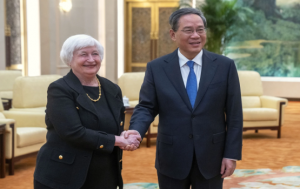
BEIJING, China (AP) — U.S. Treasury Secretary Janet Yellen and Chinese Premier Li Qiang expressed hope Friday for better communication after Yellen appealed to Beijing not to let frustration over U.S. curbs on technology exports disrupt economic cooperation.
Both governments used positive terms to describe Yellen’s visit to China’s capital, which was aimed at improving strained relations, and stressed the importance of U.S.-China economic ties. They announced no plans for more high-level meetings or to revive additional contacts that disputes over technology, security and other respective irritants have disrupted.
Yellen is one of several senior U.S. officials expected to travel to Beijing to encourage Chinese leaders to revive interactions between the governments of the world’s two largest economies. Treasury officials said earlier she wouldn’t meet with Chinese leader Xi Jinping, and no breakthroughs were expected.
In a one-hour meeting with China’s No. 2 leader that lasted twice as long as planned, Yellen said Washington and Beijing have a duty to cooperate on issues that affect the world. She appealed for “regular channels of communication” and “healthy economic competition,” a reference to complaints that China is stepping up subsidies and market barriers to protect its companies.
At the same time, Yellen defended “targeted actions,” such as U.S. curbs on Chinese access to advanced processor chips and other technology, that she said they are needed to protect national security.
“You may disagree,” the Treasury chief said. “But we should not allow any disagreement to lead to misunderstandings that needlessly worsen our bilateral economic and financial relationships.”
Li expressed optimism about U.S.-Chinese relations. He said he hoped Washington would “meet China halfway” but gave no indication of possible changes to Chinese trade and other policies that have irked Washington.
“China’s development is an opportunity rather than a challenge to the United States and a benefit rather than a risk,” Li said, according to a statement from the country’s Ministry of Foreign Affairs. “The two sides should strengthen communication and seek consensus on important issues in the bilateral economic field through candid, in-depth, and pragmatic exchanges.”
The Chinese Finance Ministry called Yellen’s visit a “concrete measure” toward carrying out an agreement by Xi and President Joe Biden during a meeting in November to improve bilateral relations. The ministry called on Washington to make the next move.
“We hope the United States will take concrete actions to create a favorable environment for the healthy development of economic and trade relations,” a ministry statement said.
U.S. curbs on Chinese access to technology threaten to delay or derail the efforts of China’s ruling Communist Party to develop telecommunications, artificial intelligence and other technologies. Xi accused Washington in March of trying to hamper China’s development.
Beijing has been slow to retaliate, possibly to avoid disrupting its tech industries. But this week, the government announced unspecified controls on exports of gallium and germanium, metals used in making semiconductors and solar panels. The announcement jolted South Korea and other countries that import from China.
During a meeting with businesspeople earlier Friday, Yellen criticized China’s treatment of American companies.

U.S. and other foreign companies are uneasy about their status in China following raids on consulting firms, the expansion of a national security law and calls by Xi and other officials for greater self-sufficiency.
“I am communicating the concerns that I’ve heard from the U.S. business community — including China’s use of non-market tools like expanded subsidies for its state-owned enterprises and domestic firms, and barriers to market access for foreign firms,” Yellen said, according to a transcript released by her department.
Yellen rejected suggestions Washington is trying to decouple, or separate the U.S. economy from China’s.
Businesspeople have warned the world’s two biggest economies might split into separate markets with incompatible products as Beijing and Washington tighten trade controls and tell companies to reduce reliance on each other. They say that would hurt economic growth and innovation.
″I have made clear that the United States does not seek a wholesale separation of our economies,” Yellen told the businesspeople. “A decoupling of the world’s two largest economies would be destabilizing for the global economy, and it would be virtually impossible to undertake.”
Yellen defended U.S. export curbs as “premised on straightforward national security considerations and not undertaken to gain economic advantage over China.”
Also Friday, Yellen met with the outgoing governor of China’s central bank, Yi Gang, and former Vice Premier Liu He, who previously was her counterpart in finance talks, according to the Treasury Department.
She is scheduled to meet and have dinner Saturday with Vice Premier He Lifeng, who succeeded Liu as Xi’s main economic aide.
Secretary of State Antony Blinken met with Xi last month in the highest-level U.S. visit to Beijing in five years. The two agreed to stabilize relations but failed to agree on improving communications between their militaries.
The latest flareup came after President Joe Biden referred to Xi as a dictator. The Chinese government protested, but Biden said his blunt statements are “just not something I’m going to change very much.”
Ties became especially testy after a Chinese surveillance balloon flew over the United States in February and was shot down.
Biden’s climate envoy, John Kerry, is due to visit China next week. China and the United States are the world’s top emitters of climate-changing carbon, making whatever steps they take critical.
Beijing broke off climate discussions with Washington in August in retaliation for a visit by then-Speaker Nancy Pelosi of the House of Representatives to Taiwan, the self-ruled island democracy claimed by China as part of its territory.
____
Newsroom | theworldmail.co.uk
Source/Contribution/Photo Credit by Associated Press
